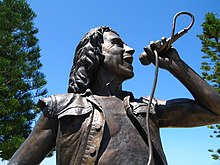After a brief tour of Sweden, they returned to London where they set new attendance records during their residency at the Marquee. However, their appearance at the 1976 Reading Festival failed to get a response from the crowd. They toured extensively throughout Europe, then returned to tour Australia in late 1976 to rebuild their finances and record their fourth studio album, Let There Be Rock.
In early 1977, they returned to Britain and began a European tour with Black Sabbath. While Bon Scott and Ozzy Osbourne quickly became friends, relations were less than cordial between the other members of the respective bands. In one incident, Geezer Butler pulled a "knife" on Malcolm Young, though it was a "silly" flick-knife comb. Later in the year they toured with Rainbow.
Towards the end of 1977, bassist Mark Evans was dismissed. Evans described disagreement with Angus and Malcolm as a contributing factor. He was replaced by Cliff Williams, an experienced bass player who had played with several UK bands since the late 60s. Neither of the Young brothers has elaborated on the departure of Evans, though Richard Griffiths, the CEO of Epic Records and a booking agent for AC/DC in the mid-1970s, later commented, "You knew Mark wasn't going to last, he was just too much of a nice guy." Mark Evans' autobiography, Dirty Deeds: My Life Inside/Outside of AC/DC, released in 2011, predominantly dealt with his time in AC/DC, including being fired.
AC/DC were a somewhat formative influence on the new wave of British heavy metal bands who emerged in the late 1970s, such as Saxon and Iron Maiden, in part as a reaction to the decline of traditional early 1970s hard rock bands. In 2007, critics noted that AC/DC, along with Thin Lizzy, UFO, Scorpions, and Judas Priest, were among "the second generation of rising stars ready to step into the breach as the old guard waned."

Niciun comentariu:
Trimiteți un comentariu